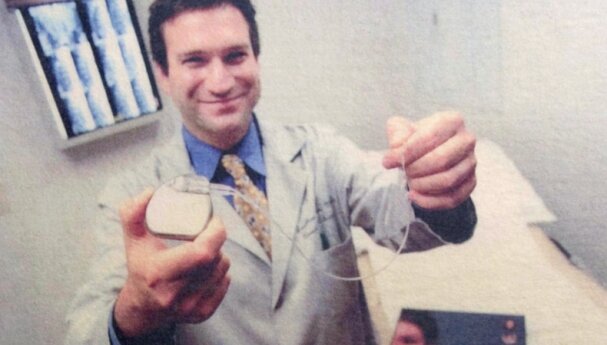Pacemaker for the Brain
The News Sun
Implanted device in chest helps control seizures
Living with a chronic seizure disorder such as epilepsy can be an existence of disquieting uncertainty.
Symptoms, which can strike at any time, can range from dizziness and headaches to violent muscle contractions and a loss of consciousness. Driving is out of the question, work can be affected and social situations are tinged with anxiety about the possibility of an attack.
A relatively new and simple surgical procedure is offering significant hope for patients whose seizures cannot be brought under control with medications alone.
A device called the Vagus Nerve Stimulator is implanted under the skin in the upper left chest area, where it goes to work stimulating the Vagus Nerve, a process that disrupts the abnormal brain activity responsible for seizures.
“Think of it as a pacemaker for the brain,” said Jonathan Citow, chief neurosurgeon at Condell Medical Center.
Positive results
The Vagus Nerve Stimulator was unveiled about two years ago, and Citow said he has been performing the implantation procedure on patients for about a year, with very positive results.
The surgery takes about 40 minutes with the patient under general anesthesia, has a very low rate of complications and in many cases the patient can go home the same day, Citow said. More importantly, it significantly reduces the occurance of seizures and in some cases eliminates them entirely.
“The best thing about it is that it allows us to help a sub-group of the population that hasn't been helped before. It gives them a much better quality of life,” Citow said. “The long term affects are remarkable.”
Citow said candidates for the surgery are patients who have tried several medications to control seizures without positive results. Following the surgery, some patients become seizure-free while others are able to use the device in conjunction with less powerful medications.
Few side affects
There are very few side affects from the procedure, Citow said. Patients may need to have the device's battery changed every five to 10 years, like a pacemaker.
Strong medications for seizure disorders, on the other hand, can result in serious side effects including liver damage, lethargy and birth defects.
Citow said the procedure is generally recommended for those who have tried multiple medications for more than a year and still have frequent seizures. Before recommending the surgery, Citow said performs an MRI on patients to make sure that there is no structural lesions in the brain that may be corrected to cure the disorder.
Seizures can be caused by benign tumors, hormonal changes and sometimes may be triggered by illness or sensory stimulation due to certain lights and sounds. Often, however, no cause or trigger is identified. The term epilepsy is used to describe seizure disorders when the cause cannot be identified.
When medicines fail those with chronic seizure disorders, it can degrade all aspects of life.
“They can't drive. It's difficult to function in social situations because they are afraid they may fall down, convulse, and soil themselves,” Citow said.
The disorders, which affect about 1 percent of the population, have also been shown to affect psycho-social and intellectual development, especially in children. Citow said.
Citow said one of his patients had such a serious seizure disorder that he had to be frequently hospitalized until receiving a Vagus Nerve Stimulator. “It was a wonderful, wonderful result,” he said.
[Photo: Dr. Jonathan Citow, a neurosurgeon at Condell medical Center holds a Vagus Nerve Stimulator which is used to disrupt the abnormal brain activity responsible for seizures.]

